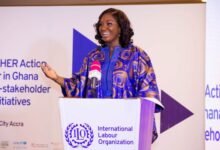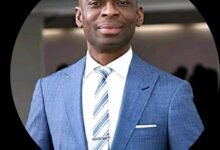THE “AIRBUS” CORRUPTION ENQUIRY MUST NOT BE LIMITED TO “OFFICIALS” ONLY!

Our country needs many basic things. We need more money to build more health facilities, or provide top-notch maintenance for those we already have. For what is a nation worth, whose inhabitants are constantly afraid that if they fall sick, they will die?
We also need enormous sums of money to repair our bad roads, turn two-way roads into one-way systems, and light up our dark city roads. For right now, the simplest journey can fill our hearts with terror.
Finally, among our priorities must be an upgrading of our schools so that we can turn out scholars who can compete in the vastly transformative technological world that is running away from us at lightning speed.
We do have several other financial headaches, and it is therefore maddening to hear that the little money our state accrues has been wasted – or more usually stolen – by those who should be using it to provide us with the amenities we need.
PROCUREMENT of goods and services by public bodies and agencies is perhaps the easiest way of obtaining enormous sums of money by dubious means. But because the stealing is deftly carried out (through syndicates that are well-practised in an art which the Italian Mafiosi call ‘UMERTA’ or “keeping mum”) we never get to the bottom of the stealing . The thieves, when caught, say NOTHING to incriminate members of their syndicate, or disclose its methodology.
Many Ghanaians believe that the syndicate system appears to have got cemented in Ghanaian society with a vengeance. Well, thank God, we now have irrefutable evidence of its existence. According to a judgement given in a High Court in London on 31 January 2020, the British-French aircraft manufacturer, Airbus, has been fined 3,000 MILLION POUNDS (£3 billion) for selling aircraft to Ghana through BRIBES it paid to “intermediaries”. Apart from Ghana, Airbus also used the same method of bribery in Malaysia, Taiwan and Indonesia.
The company admitted its wrongdoing too prosecutors, rather than defend itself in open court. This means that the company has apparently benefited from NOT making full public disclosure, thereby enabling it to keep secret, the names of the wrongdoers in the matter.
Anti-corruption investigators in the UK are gloating over the fact that the case has resulted in “the largest ever corporate fine for bribery in the world.” But although the judges declared the corruption as “grave, pervasive and pernicious,” Yet they refrained from publicly naming those who benefited financially from the “grave, pervasive and pernicious” corruption. Do they care at all whether such corruption will cease in relatively poor developing countries?
The president of the UK High Court remarked that “The seriousness of the criminality” in the case hardly needed “to be spelled out”. All sides had acknowledged that “it was grave.”
The scale of the wrongdoing demonstrated that bribery was “endemic in two core business areas within Airbus.” The company had “used a network of secret agents to pay large-scale backhanders to officials in foreign countries to land high-value contracts.” So, why not name and shame them and potentially put them out of business? Why not give the world public a lesson on the calamitous results of bribery? I think the British court has neglected its duty to the world at large. It has been too insular, in this matter.
Counsel for the UK Serious Fraud Office (SFO) had told the court that Airbus had paid bribes in “Malaysia, Sri Lanka, Indonesia, Taiwan and Ghana, between 2011 and 2015.”
In Ghana, under the late President John Atta-Mills (in 2011) and former President John Mahama (in 2015) the state acquired three Airbus C295 planes as part of an effort to augment and modernize the fleet of the Ghana Air Force. The cost is believed to have been £150 million.
The SFO Counsel told the court that “between July 1, 2011, and June 1, 2015, Airbus SE failed to prevent persons associated with Airbus SE from bribing others concerned with the purchase of military transport aircraft by the Government of Ghana, where the said bribery was intended to obtain, or retain, business or advantage in the conduct of business for Airbus….
“Between 2009 and 2015, [the company] engaged “Intermediary 5”, a close relative of a high ranking, elected Ghanaian government official (“Government Official 1”), as its agent in respect of the proposed sale of three aircraft to Ghana. A number of Airbus employees knew that “Intermediary 5” was a close relative of “Government Official 1”, a “key decision maker” in respect of the sales. Promises of success-based commission payments of approximately £5 million were made to “Intermediary 5”.
“False documentation was created by, or with the agreement of, Airbus employees, in order to support and disguise these payments. The payments were intended to induce or reward improper favour by the “Government Official 1” towards Airbus.” .
“Intermediary 5,” according to the court document (which seems to have been deliberately worded to cause frustration in Ghana!) is “a UK national born in Ghana, … brought to the United Kingdom as a young child and lost touch with his Ghanaian family until the late 1990s. He had no prior experience or expertise in the aerospace industry. A CV provided to Airbus in 2011 listed “Intermediary 5’s employment before 2009 as an “events manager for a local authority;” and “director of a football merchandising company”.
“Intermediary 5” was assisted in his Airbus work by two other UK nationals: “Intermediary 6” and “Intermediary 7.”
The Ghana Government, in a statement, says President Nana Addo Dankwa Akufo-Addo, has tasked the Office of the Special Prosecutor to conduct an inquiry into the involvement of any public official, “past or present” who may have been engaged in the Airbus bribery scandal. The statement said the Office of the Special Prosecutor had been requested “to collaborate with its UK counterparts to conduct a prompt inquiry to determine the complicity or otherwise of any “Ghanaian government official, past or present”, involved in the said scandal, and to take the necessary legal action against any such official, as required by Ghanaian law.”
I am not happy about the fact that the Government wants to limit the enquiry by the Special Prosecutor to “Government official(s)”
past or present. In cases of bribery, influential private citizens often have a crucial “Intermediary” role to play that is as vital as that of “officials”. So they must be fished out and charged with “aiding and abetting” the crime of corruption.
This issue must be cleared up in the outset. Otherwise, someone may conceivably accuse the Special Prosecutor of overstepping his mandate.
The Special Prosecutor must astutely utilise Ghana’s agreements with Interpol, to obtain the names of the “Intermediaries” known to the legal authorities in the jurisdictions of the UK, France and the USA, but not so far publicly disclosed.
It is to be hoped that the Ghana Government will put its FULL WEIGHT behind the Special Prosecutor in this matter. For it will be laughable to pretend that corruption in Ghana occurs only among, or is promoted only, by “Government officials”.
By CAMERON DUODU



